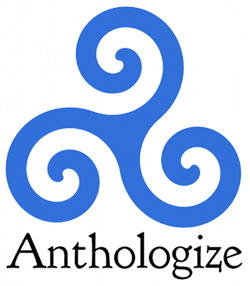
 My friend Effie Kapsalis helped make something very, very cool. Something brilliant, actually. Something you need to check out: Anthologize.
My friend Effie Kapsalis helped make something very, very cool. Something brilliant, actually. Something you need to check out: Anthologize.
A brilliant idea is defined by how hard you slap yourself in the forehead, saying, “gee, that’s awesome — but so obvious, why didn’t I think of that?” Anthologize is that simple, elegant, “it never occurred to me” idea that I have been waiting for forever: a WYSIWYG way of drag-and-dropping together a linear narrative out of what is often an amalgam of reverse-chronological, jumbled-together, blog posts. Export it into an online, web-accessible “book” or even a proper ebook in the PDF, ePUB or TEI formats that can be exported and popped into your favorite ebook reader like the Amazon Kindle or Sony eReader.
Anthologize and presents itself as a free, easy-to-install and easy-to-grok WordPress plug-in.
Anthologize is a project of One Week | One Tool, a project of the Center for History and New Media, George Mason University. Funding provided by the National Endowment for the Humanities. © 2010, Center for History and New Media. For more information, contact infoATanthologizeDOTorg. Follow @anthologize.
While I have already installed it into both Chris Abraham and Marketing Conversation, I am overwhelmed with how many posts there are on both blogs that I have yet to organize my thoughts and do something with it. However, there has been quite a bit of press on the Anthologize project already.
In our first-ever live broadcast, Digital Campus hosts the big reveal of what came out of One Week | One Tool, a National Endowment for the Humanities-sponsored institute at the Center for History and New Media that brought together a diverse group of developers and scholars to produce a useful software application for the humanities (and beyond) in just one week. Joining the regulars on the podcast are four members of the One Week team, Boone Gorges, Kathie Gossett, Effie Kapsalis, and Steve Ramsay. The tool revealed, Anthologize, is a WordPress-based platform for book publishing. Regular Mills Kelly finds Anthologize as beautiful as his Hawaiian vacation. (Download the .mp3)
And you can now see and experiment with what we built, Anthologize. It’s not a tool with a big scope – it does one thing well (although it is an alpha, so there are known issues). It enables researchers, curators, writers – and bloggers in general – to compile, edit, and publish anything available through RSS feeds. From Anthologize, you can send out your compile work as an eBook, paper publication, or TEI (an open XML format for storage and exchange).
Anthologize enables anyone working with WordPress to easily publish their content in a variety of book formats, including PDF, ePUB, and TEI, an open XML format. Anthologize can handle WordPress blog content as well as feeds from other sources, allowing these items to be updated, reordered, and edited, and then exported.
Blogging has become an increasingly important tool for scholars and educators to share their ideas, but once blogged, that’s often the end-of-the-line for that writing. Anthologize organizes this content and enables users to publish and distribute their work in additional ways – via print or e-readers.
Tim Carmody at Snarkmarket reports on the success of “one week I one tool”, in which a group at the US Center for Digital Humanity spent a week designing and building a digital tool from scratch.
They posted teasers about the project online but did not reveal the result of their work until the seven days were up:
“They put together a great open-source tool: Anthologize, a WordPress plugin that helps you take online content like blog posts and collect, edit, design, and format them into a book — for either digital or print. Solid software, with obvious utility for lots of people, not just academics.”
And it’s open source too – which makes it a free for all. Bookbinding is certainly a lot less fiddly these days…
Anthologize is a WordPress plugin that allows scholars, conference organizers, and bloggers to create eBooks out of websites. Its creators imagine it could be used by researchers to “sketch ideas, collaborate with co-authors, edit and develop research notes into arguments, publish conference proceedings, and engage in public scholarly communication without the typical barriers.” Or perhaps teachers will turn their class blogs into custom publications.
So, what separates Anthologize from commercial blog-to-book services like Blurb or Lulu? (Both fantastic services, IMHO.) First, it’s a WordPress plugin, so if you’re familiar with that tool (as many are), it should be easy to manipulate.
“Because it’s open source, third-party developers can create translators and importers for other formats as well, and contribute them back,” added Doug Knox, director of publication and digital initiatives at the Newberry Library, and part of the One Week, One Tool team. “Lulu and Blurb — and others like FastPencil — are focused on commercial blog-to-book publishing. They don’t have as much flexibility in importing existing content, and they aren’t as open to extending the range of output formats.”
This was all the result of the One Week One Tool project and, to be honest, shows that Rapid Application Development can be the start of a true gift and a true legacy to the world of coding, open source, and online publishing and personal publishing empowerment. Via Chris Abraham.Chris Abraham is a partner in Socialmedia.biz. Contact Chris via email, follow him on Twitter and Google Plus or leave a comment below.
Wow. I’ll check it out. I have a couple of blogs that I would love to convert to e-books. Thanks for the heads up.
Great post and interesting service. I like how it plugs into WordPress.
Here's another: http://bookbrewer.com
We just launched in alpha, but should be in open beta shortly. We're looking for charter authors to help us test the system, and we're offering free ISBN numbers (and more) for those who need them.